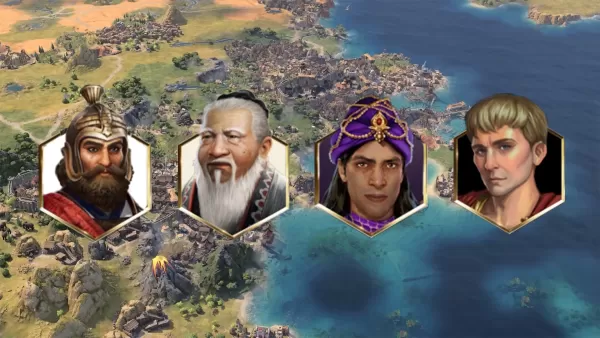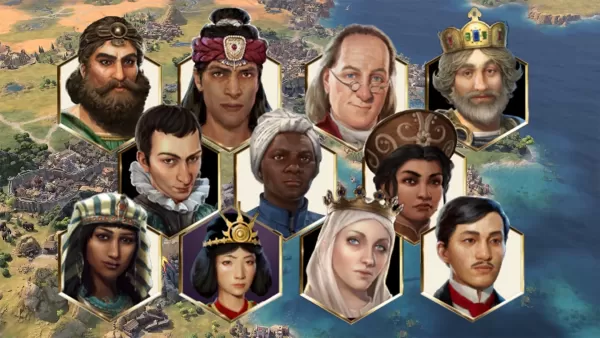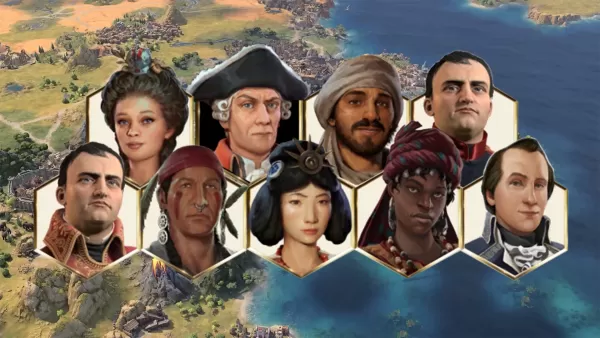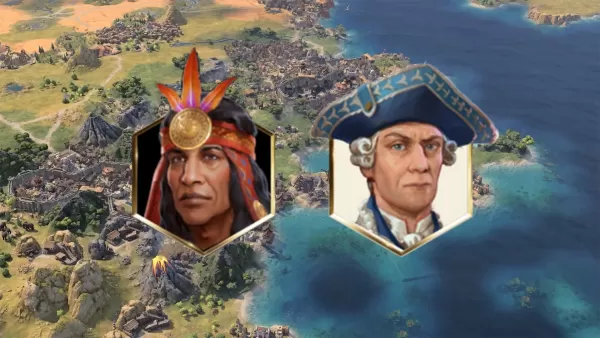Civilization 7 Leaders: Top Tier Rankings
- By Simon
- May 23,2025
Civilization 7 introduces a dynamic Ages mechanic that propels players through Antiquity, Exploration, and Modern Ages, requiring them to adapt and evolve their civilization. Despite this shift, the chosen leader remains constant throughout the game, providing a consistent strategic foundation. Leaders in Civilization 7 are crucial, offering unique abilities that can greatly influence gameplay. To assist players in making informed decisions, we've compiled a comprehensive tier list of every leader, detailing their strengths and weaknesses. This guide is tailored for standard, single-player games and does not include DLC leaders such as Ada Lovelace or Simón Bolívar.
Civilization 7 Leader Tier List
S-Tier - Confucius, Xerxes King of Kings, Ashoka World Conquerer, Augustus
A-Tier - Ashoka World Renouncer, Benjamin Franklin, Charlemagne, Harriet Tubman, Hatshepsut, Himiko High Shaman, Isabella, Jose Rizal, Machiavelli, Trung Trac, Xerxes The Achaemenid
B-Tier - Amina, Catherine The Great, Friedrich Oblique, Ibn Battuta, Lafayette, Napoleon Emperor, Napoleon Revolution, Tecumseh, Himiko Queen of Wa
C-Tier - Friedrich Baroque, Pachacuti
S-Tier Leaders
 ### S-Tier: Ashoka, World Conquerer
### S-Tier: Ashoka, World Conquerer
Ashoka, World Conquerer, excels at maintaining high levels of happiness while exerting military dominance over other civilizations. With +1 Production for every 5 excess Happiness in Cities and a +10% Production boost in settlements not founded by you, Ashoka enables rapid unit production and expansion. Declaring a formal war triggers a Celebration, granting all units a +5 Combat Strength against districts, making Ashoka a formidable force on the battlefield. Managing unrest in conquered settlements is key to maintaining this leader's power, but when executed well, Ashoka's ability to convert happiness into military might is unparalleled.
S-Tier: Augustus
Augustus focuses on expanding through a wide network of towns, gaining +2 Production in the Capital for each town. He can purchase Culture Buildings in towns at a 50% discount in Gold, making him a powerhouse for both Production and Culture. Augustus's strategy revolves around establishing and maintaining as many towns as possible without upgrading them to cities, thereby saving resources while boosting his capital's output. This straightforward yet effective approach positions Augustus as a top-tier leader for those looking to build a vast, efficient empire.
S-Tier: Confucius
Confucius is renowned for his ability to expand cities rapidly, offering a +25% Growth Rate in Cities. This early advantage allows for swift territorial expansion and resource acquisition. Additionally, Confucius gains +2 Science from Specialists, making him a leader of choice for players aiming to lead in technological advancement. While he may require support in defense, his capacity to grow and innovate makes him a formidable leader throughout the game.
S-Tier: Xerxes, King of Kings
Xerxes, King of Kings, is a straightforward military leader, gaining +3 Combat Strength for units attacking in neutral or enemy territory. Upon capturing a settlement for the first time, Xerxes receives 100 Culture and Gold per Age and enjoys a +10% Gold increase in all settlements, with higher yields in those not founded by him. With an increased settlement limit per Age, Xerxes is ideally suited for players aiming for a Military Victory through aggressive expansion and conquest.
A-Tier Leaders
 ### A-Tier: Ashoka, World Renouncer
### A-Tier: Ashoka, World Renouncer
Ashoka, World Renouncer, transforms excess Happiness into population growth, offering +1 Food in Cities for every 5 excess Happiness and a +10% Food boost in all settlements during a Celebration. All buildings gain a +1 Happiness adjacency bonus for all improvements, making Ashoka a strong choice for players focused on expanding their population and constructing districts. While less aggressive than his World Conquerer counterpart, Ashoka, World Renouncer, provides a nuanced strategy for players who excel at city management and growth.
A-Tier: Benjamin Franklin
Benjamin Franklin is a versatile leader for those pursuing a Science Victory. He gains +1 Science per Age on Production Buildings in Cities and enjoys a 50% Production boost towards constructing these buildings. Franklin can also have two Endeavors of the same type active at a time, further enhancing his Science output. His synergy between Science and Production makes him an excellent choice for players aiming to advance quickly through the technology tree.
A-Tier: Charlemagne
Charlemagne combines military and scientific prowess, gaining Happiness adjacency bonuses for Military and Science Buildings. Upon entering a Celebration, he receives two free Cavalry Units and a +5 Combat Strength boost for these units. This strategy is particularly effective in the early and mid-game, where cavalry units can dominate. While Charlemagne may face challenges in the Modern Age, his ability to leverage Celebrations for military advantage makes him a strong leader.
A-Tier: Harriet Tubman
Harriet Tubman is a stealthy leader with a focus on Espionage, gaining a 100% Influence boost towards initiating Espionage Actions. She also gains 5 War Support on all wars declared against her and her units ignore movement penalties from vegetation, making her elusive and hard to pin down. Tubman's ability to disrupt other civilizations and maintain defensive strength makes her a top choice for players who enjoy a more covert approach to victory.
A-Tier: Hatshepsut
Hatshepsut excels in Culture generation, gaining +1 Culture for every imported Resource and a +15% Production boost towards constructing Buildings and Wonders near Navigable Rivers. Her strategy revolves around establishing strong trade relationships and leveraging these for cultural advancement. Hatshepsut's focus on Wonders and Buildings makes her a top pick for players aiming to dominate the Culture Legacy Paths.
A-Tier: Himiko, High Shaman
Himiko, High Shaman, is a leader who excels in generating Culture, with a +2 Happiness per Age on Happiness Buildings and a 50% Production boost towards constructing these buildings. She gains a +20% Culture boost, which doubles during Celebrations, though this comes at the cost of a -10% Science penalty, also doubled during Celebrations. Himiko's strengths lie in her ability to rapidly advance through the Culture Legacy Path, making her a top choice for cultural victories.
A-Tier: Isabella
Isabella can gain significant early advantages by discovering Natural Wonders, receiving 300 Gold per discovery, doubled if the Wonder is in Distant Lands. She also gains a 100% increase in tile yields from Natural Wonders and a 50% Gold discount on purchasing Naval Units with reduced maintenance costs. Isabella's strategy hinges on securing Natural Wonders early, making her a strong choice for players who can capitalize on these unique map features.
A-Tier: Jose Rizal
Jose Rizal excels at prolonging and benefiting from Celebrations, with a 50% increase in Celebration duration and a 50% Happiness boost towards Celebrations. He also gains additional Culture and Gold from Narrative Events, which occur more frequently for him. Rizal's focus on maximizing the benefits of Celebrations makes him a top choice for players aiming to leverage these periods for significant gains.
A-Tier: Machiavelli
Machiavelli is a master of diplomacy and deceit, gaining +3 Influence per Age and 50 Gold per Age when his Diplomatic Action proposals are accepted, or 100 Gold when rejected. He can ignore Relationship requirements for declaring Formal Wars and levy Military Units from City-States he is not Suzerain of. Machiavelli's ability to manipulate diplomatic situations and quickly amass military power makes him a top choice for players who enjoy a more cunning approach.
A-Tier: Trung Trac
Trung Trac is focused on leveraging Army Commanders, starting with three free levels on the first Army Commander and gaining a 20% Commander experience boost. She also enjoys a 10% Science boost in Cities in Tropical Spaces, which doubles during Formal Wars she declares. Trung Trac's ability to quickly develop powerful Army Commanders makes her a top choice for players aiming to dominate militarily.
A-Tier: Xerxes, The Achaemenid
Xerxes, The Achaemenid, excels in generating Culture and Gold through trade, gaining +1 Trade Route limit with all other leaders and 50 Culture and 100 Gold per Age when creating Trade Routes or Roads. He also gains +1 Culture and Gold per Age on Unique Buildings and Unique Improvements. Xerxes's focus on trade and unique structures makes him a top choice for players aiming to build a prosperous and culturally rich empire.
B-Tier Leaders
 ### B-Tier: Amina
### B-Tier: Amina
Amina is a decent leader who excels with Resource management, gaining +1 Resource Capacity in Cities and +1 Gold per Age for each Resource assigned to Cities. Her units also gain a +5 Combat Strength in Plains or Desert, making her a situational choice depending on the map. Amina's focus on maximizing Resource benefits makes her a good choice for players who can secure and utilize these effectively.
B-Tier: Catherine the Great
Catherine the Great is a strong producer of Culture, gaining +2 Culture per Age on displayed Great Works and an additional slot for Great Works. Cities settled in Tundra gain Science equal to a percentage of their Culture per turn, making her a situational leader depending on the map. Catherine's focus on Culture and situational Science gains makes her a good choice for players who can leverage these bonuses effectively.
B-Tier: Friedrich, Oblique
Friedrich, Oblique, focuses on Army Commanders, starting with the Merit Commendation and gaining an Infantry Unit when constructing a Science Building. While he lacks direct Science, Influence, or Culture buffs, his focus on military strength through Army Commanders makes him a decent choice for players aiming to build a strong military.
B-Tier: Ibn Battuta
Ibn Battuta is a versatile leader, gaining 2 Wildcard Attribute Points after the first Civic in every Age and +1 Sight for all Units. He also gains a unique Endeavor called Trade Maps, allowing him to see other Leaders' explored areas gradually. Ibn Battuta's flexibility and map visibility make him a good choice for experienced players who can utilize these benefits effectively.
B-Tier: Lafayette
Lafayette has a unique Endeavor called Reform, granting an additional Social Policy slot and +1 Combat Strength for every Tradition slotted into Government. He also gains +1 Culture and Happiness per Age in Settlements, doubled in Distant Lands. Lafayette's focus on Social Policies and situational bonuses makes him a decent choice for players who can leverage these effectively.
B-Tier: Napoleon, Emperor
Napoleon, Emperor, excels at disrupting trade through the Continental System Sanction, reducing the Trade Route limit of targeted Leaders. He gains +8 Gold per Age for every Leader he is Unfriendly or Hostile with and can reject Endeavors for free. Napoleon's focus on creating chaos and gaining Gold from negative relationships makes him a decent choice for players who enjoy a more aggressive diplomatic strategy.
B-Tier: Napoleon, Revolutionary
Napoleon, Revolutionary, gains +1 Movement for all Land Units and Culture equal to 50% of enemy Combat Strength when defending. His unique playstyle requires frequent defensive engagements to maximize Culture gains, making him a situational choice depending on the player's strategy. Napoleon's focus on mobility and defensive Culture gains makes him a decent choice for players who can leverage these effectively.
B-Tier: Tecumseh
Tecumseh gains +1 Food and Production per Age in Settlements for every City-State he is Suzerain of and +1 Combat Strength for all units for every City-State Suzerain. His potential is high, but becoming a Suzerain requires significant Influence and time. Tecumseh's focus on leveraging City-States makes him a good choice for players who can build the necessary infrastructure and alliances.
B-Tier: Himiko, Queen of Wa
Himiko, Queen of Wa, excels in Science through alliances, gaining a unique Endeavor called Friend of Wei that grants +25% Science to both her and her ally. She also gains +4 Science per Age for every Leader she is Friendly or Helpful with and can support Endeavors for free. Himiko's focus on diplomacy and Science gains makes her a good choice for players who can maintain positive relationships.
C-Tier Leaders
 ### C-Tier: Friedrich, Baroque
### C-Tier: Friedrich, Baroque
Friedrich, Baroque, gains a Great Work when capturing a Settlement for the first time and an Infantry Unit when constructing a Culture Building. While these traits are decent, they lack the distinctiveness and strength of higher-tier leaders. Friedrich's focus on Culture and military gains makes him a situational choice.
C-Tier: Pachacuti
Pachacuti gains +1 Food adjacency bonus for Mountains and no Happiness maintenance cost for Specialists adjacent to Mountains. His potential is high if the map features Mountains, but without them, he provides little value. Pachacuti's focus on leveraging Mountain adjacency makes him a situational choice depending on the map.






